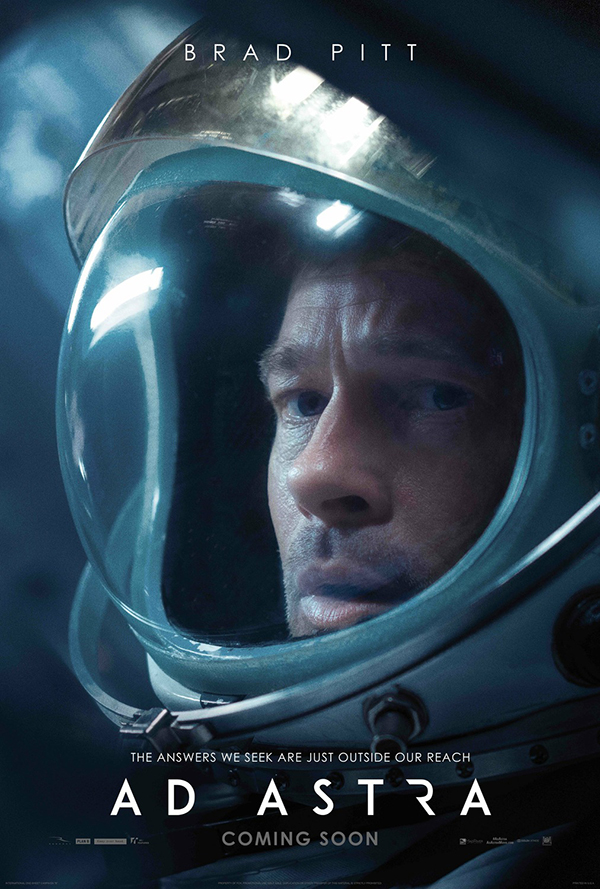We are in the midst of a science fiction renaissance. The mid-to-late 2010s have been host to numerous blockbusters such as Interstellar, Arrival, Blade Runner 2049, and Annihilation in addition to smaller, independent, and more intimate movies like Prospect, High Life, and Ex Machina. But regardless of these movies’ differences in tone, budget, and theme, they all hark back to the golden era of sci-fi cinema in the ‘70s and ‘80s.
I was reminded of this recently when I had the pleasure of watching Ad Astra: a tragic, yet hopeful, sci-fi drama from director James Gray starring Brad Pitt, Tommy Lee Jones, Donald Sutherland, and Natasha Lyonne in addition to many other recognizable names. Ad Astra tell the story of an accomplished but emotionally walled-off astronaut, played masterfully by Brad Pitt, who takes to the stars (which “ad astra” is Latin for) in order to find his long-lost father.
Rife with Freudian symbolism and existentialist philosophy, it is perhaps easier to articulate what makes Ad Astra so captivating by comparing it with several other great films. The first that comes to mind is ***Interstellar, the 2014 Christopher Nolan directed epic chronicling humanity’s desperate search for refuge off a dying planet. While the two blockbusters may seem closely related, their setting is as close as the parallels come. Without spoiling either of the two movies, ***Interstellar is very much a call back to the hopeful sci-fi of the ‘50s: humanity perseveres, and the main characters find closure in their own way.
Ad Astra, however, tells a darker, more realistic, and identifiable story. A story of abandonment, loneliness, and utter resignation. A story that, unfortunately, many viewers may feel diverts from the escapism one might expect from your average sci-fi flick. In fact, a far more accurate (and identifiable for cinephiles and classic movie buffs out there) parallel is to the 1979 Coppola masterpiece, Apocalypse Now. Set during the Vietnam war, Martin Sheen plays a introspective army captain tasked with hunting down and killing a rogue colonel now being worshipped as a god in the jungle by its native inhabitants. Apocalypse Now is submerged in allegories concerning the sexualization of violence, desensitization to war, and the human descent into madness. While Ad Astra has very different ideas at play, the story itself is not only remarkably similar but the tone is as well. Throughout both movies, we watch Brad Pitt and Martin Sheen drift through space and down the river, respectively, to confront their own demons in anticlimactic, and yet so thoroughly impactful, finales.
Brad Pitt’s performance is, once again, nothing short of fantastic, begging the audience to relate to his feelings of isolation and emotional suppression as his insignificance is made more and more apparent throughout the film via the use of masterful cinematography with long and punctual shots conveying either meaninglessness in an infinite universe or atavistic panic. Both Tommy Lee Jones as cosmonaut Clifford McBride and Donald Sutherland as Colonel Pruitt also provide mature performances one could expect from such veterans of filmmaking. There are several moments in the movie where the symmetry and raw beauty of the set pieces are so jaw-dropping that they are comparable to the legendary 2001: A Space Odyssey by Stanley Kubrick.
But while stunning, the movie does have its fair share of flaws. The score of Ad Astra does not hold up in comparison to genre legends such as A Space Odyssey’s use of classical pieces and Hans Zimmer’s organ-laden symphonies from Interstellar. While complementary, there is never a particular moment in the film where I felt that the music made a serious contribution to the presentation of its otherwise flawless aspects. In a sci-fi film, this is a far more noticeable detraction than it would be in other genres.
Ad Astra makes for a brilliant parable on the oftentimes strained relationships between fathers and sons and the unhealthy coping mechanisms we develop when we are unable to communicate our despair. I definitely recommend catching this movie on the big screen to really allow yourself to become fully immersed in the setting. Both psychology and philosophy students will enjoy this movie, as will most others who enjoy semi-arthouse films. While some might call the ending a sad or tragic one, with the right perspective it can be a liberating and hopeful beginning for somebody who is ready to let go.


